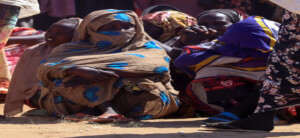17-year-old raped at North Darfur well
A complaint has been filed with police after a young woman was reportedly raped, and her companions savagely beaten, when they went to draw water from a well in Tabit locality, North Darfur on Saturday.
 Women collect water from a well in North Darfur (File photo: Albert González Farran / Unamid)
Women collect water from a well in North Darfur (File photo: Albert González Farran / Unamid)
A complaint has been filed with police after a young woman was reportedly raped, and her companions savagely beaten, when they went to draw water from a well in Tabit locality, North Darfur on Saturday.
A member of the native administration, Sheikh Abdallah Jengu, told Radio Dabanga that three girls aged 17, 16, and 13 went to fetch water from the Koto well near Hashaba south of Tabit on Saturday morning.
The owner of the well, identified only as ‘Hemeida’, allegedly seized the girls, beat the 13- and 16-year-olds with a whip, and raped the 17-year-old at gunpoint.
Sheikh Jengu said that the victim’s father, accompanied by Sheikh Adam Hasan of the Hashaba area, filed a complaint with Tawila police.
No arrest has been reported to date.
Gender-based violence
As previously reported by Radio Dabanga, the Strategic Initiative for Women in the Horn of Africa, SIHA Network, announced a 50 per cent increase in rapes of displaced women in El Fasher, capital of North Darfur. There is also an increase in urinary fistula among girls as a result of sexual violence, the network said in a .statement on the occasion of the International Day against Sexual Violence in Conflict Zones on June 19.
SIHA Network bases its announcement on data of the Saudi Hospital in El Fasher.
It states that displaced women are forced to leave the camps in search of a livelihood, which exposes them to violence from militias and armed security forces that move around the cities, villages, and camps in North Darfur unchecked.
The network demands criminalisation of sexual violence in conflict areas, and ratification of the Convention on the Elimination of Discrimination against Women (CEDAW) and the African Protocol on the Rights of Women.
Special unit
Also on June 19, Sudan’s Minister of Labour and Social Development, Lina El Sheikh, said that Sudan is to establish a special unit to combat violence against women aimed to improve conditions for women, to protect them, and preserve their dignity. The transitional government is also drafting a new law to further criminalise gender-based violence.
In an interview on the occasion of the International Day for the Elimination of Sexual Violence in Conflict, Minister El Sheikh said that material on the new law is to be included in teaching materials in the curricula of the military college, the police, the medical and health colleges, and legal studies. There will also be training courses for the various regular forces, in coordination with state agencies and civil society organisations, to protect the public from this type of violence in conflict zones.
El Sheikh said that a clearance of procedures document has been competed to address gender-based violence in Sudan, noting that her ministry launched a hotline service to receive reports of domestic violence in coordination with the Family and Child Protection Unit of the police and the specialised prosecution. She said that psychological, social, health, and legal support is provided in accordance with international standards.
She revealed the preparation of a national plan to implement Security Council Resolution 1325 on women, security, and peace, which was passed in the transitional cabinet last March during the celebration of the International Women’s Day.
On the occasion of International Women’s Day on March 8, Prime Minister Abdallah Hamdok assured his government’s commitment “to end all aspects of institutional and social discrimination against women, in order to ensure their rights in all parts of the country.
“Achieving equality is one of the basic principles for making a successful and sustainable peaceful transition in Sudan,” he said. “The participation of women in all its institutions should be enhanced in a way that reflects their great role in the transition”.
Radio Dabanga’s editorial independence means that we can continue to provide factual updates about political developments to Sudanese and international actors, educate people about how to avoid outbreaks of infectious diseases, and provide a window to the world for those in all corners of Sudan. Support Radio Dabanga for as little as €2.50, the equivalent of a cup of coffee.












 and then
and then